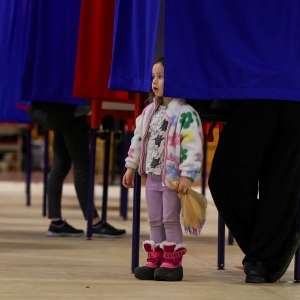Senate holds hearing on trans sports ban bill

Holly Ramer/AP file photo
| Published: 04-30-2024 4:59 PM |
In the latest hearing for a proposed ban on transgender athletes under consideration in New Hampshire’s State House, Pembroke resident and retired physician Jennifer Smith expressed a more nuanced position than most on the divisive issue.
While acknowledging that men have certain biological advantages, Smith, who identified herself as a transgender woman, agreed that certain eligibility requirements should be put in place, yet opposed a blanket ban on transgender girls’ participation in sports.
“I have only recently become aware that one of the track stars in Connecticut was not on hormones of any sort, and that’s problematic,” Smith said.
Smith’s testimony came at a Senate hearing on Tuesday for House Bill 1205, which would prohibit transgender girls in grades five through 12 from participating on New Hampshire Interscholastic Athletic Association-sanctioned teams designated for “girls.” It would not place a similar ban on transgender males participating on “boys” teams.
The hearing occurred a week after the House Education Committee voted 19-1 to table a similar bill brought by the Senate, SB 375, that would have extended the ban to NCAA sports. Republican Rep. Rick Ladd wrote that litigation is already in progress to change the NCAA eligibility requirements, which currently allow transgender women to participate on women’s teams under certain conditions.
On Tuesday, Smith discussed the development of similar conditions at the middle school and high school levels in New Hampshire.
“Principals get to say who is eligible and who is not. Maybe they need better guidance on who is eligible,” said Smith, who encouraged the NHIAA to study potential guidelines.
Smith said she opposed a total ban because many transgender girls take puberty blockers or cross-sex hormones.
Article continues after...
Yesterday's Most Read Articles
 Blasting set at Swenson Granite quarry, which may resume full operations this summer
Blasting set at Swenson Granite quarry, which may resume full operations this summer
 Work continues on new state psychiatric hospital in Concord
Work continues on new state psychiatric hospital in Concord
 As part of sweeping cuts, House budget writers vote to abolish nearly 200 positions from N.H. Department of Corrections
As part of sweeping cuts, House budget writers vote to abolish nearly 200 positions from N.H. Department of Corrections
 New Hampshire law enforcement to step up traffic enforcement on Route 106
New Hampshire law enforcement to step up traffic enforcement on Route 106
 Three arrested in connection with vandalism of Satanic Temple holiday display
Three arrested in connection with vandalism of Satanic Temple holiday display
 A New Hampshire ski resort bets on tech to compete with industry giants
A New Hampshire ski resort bets on tech to compete with industry giants
Still, Smith said, “There’s a lot of fraught issues in this.”
Smith’s testimony was a departure from the intense support and opposition expressed on Tuesday and at hearings on the matter throughout this legislative session.
Supporters of the bill argue it is a fundamental issue of fairness and safety, whereas opponents say it unnecessarily targets the minute number of transgender girls who play sports on girls teams in the state.
Nationally, less than 0.5% of high school athletes and approximately 30 collegiate athletes are estimated to be transgender. There is no estimate of how many transgender girls and women athletes there are in New Hampshire.
Under questioning, Republican Rep. Louise Andrus, the lead sponsor of the bill, admitted she did not know how many transgender athletes there are in the state.
At Tuesday’s hearing, supporters of the bill dismissed the notion that the small size of the transgender athlete population made it a non-issue.
“Why does it seem like we always have to wait for someone to get injured before we do something?” said Ann Marie Banfield, who identified herself as a parental rights advocate.
Eric Johnson, the father of a transgender athlete in the state, testified that his daughter did not pose a danger to the other girls she competes against.
“My daughter is not a boogeyman. My daughter is not a threat,” Johnson said. “Trans girls are not a threat.”
Prior to receiving comments from members of the public, legislators debated whether and in what manner students would be forced to prove their sex if the bill is enacted.
The bill states that sex shall be determined on the basis of birth certificate. If a student does not have a birth certificate or it does not include their sex, they would be forced to furnish at their own expense “other evidence” indicating their sex at birth.
Asked what evidence would satisfy the proposed legislation, Andrus, a Salisbury Republican, responded that she wasn’t sure.
“I would leave that up to the Department of Education or someone along that line that is very knowledgeable in that area to come up with a simple way to do testing,” Andrus said.







 Town elections offer preview of citizenship voting rules being considered nationwide
Town elections offer preview of citizenship voting rules being considered nationwide Medical aid in dying, education funding, transgender issues: What to look for in the State House this week
Medical aid in dying, education funding, transgender issues: What to look for in the State House this week On the Trail: Shaheen’s retirement sparks a competitive NH Senate race
On the Trail: Shaheen’s retirement sparks a competitive NH Senate race ‘If it affects one, it’s going to affect all’: Dozens protest federal firings in Concord
‘If it affects one, it’s going to affect all’: Dozens protest federal firings in Concord
